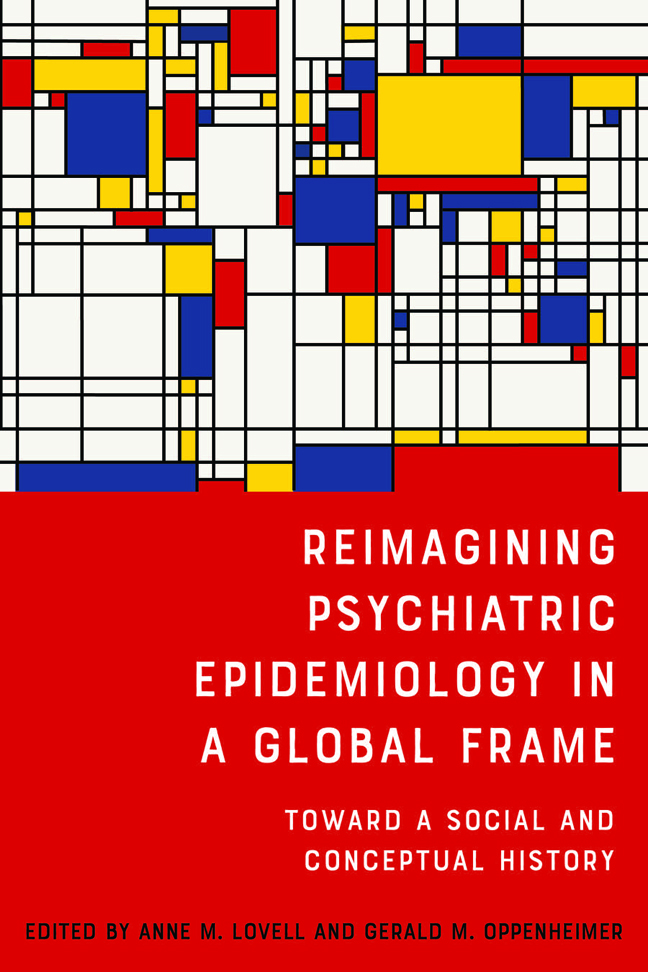Book contents
- Frontmatter
- Contents
- Acknowledgments
- Introduction
- Part One Constructing Mental Health Utopias and Dystopias with Epidemiology
- Part Two Troubling the Boundaries of Psychiatric Epidemiology
- Part Three Decentering Psychiatric Epidemiology in a Postcolonial World
- Selected Bibliography
- Notes on Contributors
- Index
Nine - Taming the Tropics with Numbers: The Origins of Psychiatric Epidemiology in Colonial Taiwan
Published online by Cambridge University Press: 15 February 2024
- Frontmatter
- Contents
- Acknowledgments
- Introduction
- Part One Constructing Mental Health Utopias and Dystopias with Epidemiology
- Part Two Troubling the Boundaries of Psychiatric Epidemiology
- Part Three Decentering Psychiatric Epidemiology in a Postcolonial World
- Selected Bibliography
- Notes on Contributors
- Index
Summary
Taiwan has been pivotal in the development of international psychiatric epidemiology not only because of its pioneering work in the comprehensiveness of mental disorder surveys but also due to its advanced survey methods. Its lauded island-wide survey conducted in the early post–World War II period and the follow-up studies, collectively known as the “Formosan model,” are important pioneering works among developing countries in the Asia-Pacific region. In one of my previous works, I demonstrated that in the 1950s and 1960s, collaboration between international and Taiwanese psychiatrists in the field was critical in shaping the World Health Organization's (WHO) international social psychiatry projects. This might provide a non-Western exam ple of a crucial post–World War II venture in psychiatry. However, it might also overemphasize the importance of Taiwan on the world map. In fact, such advances have a much more complex historical background. In this chapter, I examine studies conducted by psychiatrists working for Taihoku Imperial University (1928–1945), arguing that tropical governance under Japanese colonialism was the most significant factor in the development of psychiatric epidemiology in East Asia and that the psychiatric research methodology developed during the colonial period (1895–1945) laid the foundations for postwar international collaborative works on psychiatric epidemiology. The combination of statistics and field observational surveys developed for the purpose of Japanese colonial expansion and the opportunities for Taiwanese doctors to participate in international academic activities were cornerstones of the postwar global decolonization that accompanied developments in psychiatric epidemiology.
The Genealogy of Modern Psychiatry in Colonial Taiwan
Modern psychiatry was introduced in Taiwan in various stages during the Japanese colonial period (1895–1945), serving colonial governance in various ways. Psychiatric knowledge or, more broadly, knowledge of the psychiatric sciences was introduced to the tropical island as part of the colonizers’ plan to conduct social and cultural surveys in line with the “biological principles” of colonial planning. These principles were proposed by Gotō Shimpei (後藤新平), the first Minsei Chôkan [chief civil administrator], in 1898, three years after Taiwan became a Japanese colony. His vision was instrumental in creating the infrastructure for Japan to govern Taiwan by applying a range of administrative methods to govern the complex, but wayward, society earlier ineptly controlled by the Chinese Qing rule (1683–1895).
- Type
- Chapter
- Information
- Reimagining Psychiatric Epidemiology in a Global FrameToward a Social and Conceptual History, pp. 283 - 306Publisher: Boydell & BrewerPrint publication year: 2022

